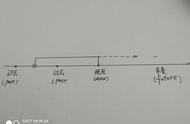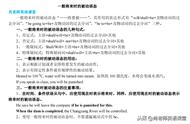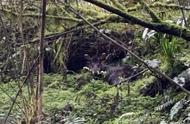
[语法点津]
现在完成时的被动语态强调一个发生在过去的被动性动作持续到现在或对现在造成的影响或结果。
一、现在完成时的被动语态的构成
have/has+been+及物动词的过去分词
二、现在完成时的被动语态的形式
1.肯定式:主语+have/has+been+及物动词的过去分词+其他。
The door has already been locked.
门早已经被锁上了。
2.否定式:主语+have/has+not+been+及物动词的过去分词+其他。
The children haven't been told the good news yet.
孩子们还没有被告知这个好消息。
3.一般疑问式:Have/Has+主语+been+及物动词的过去分词+其他?
Has his new novel been translated into English yet?
他的新小说被译成英语了吗?
4.特殊疑问式:特殊疑问词+have/has+主语+been+及物动词的过去分词+其他?
How long has the house been built?
这所房子建了多久了?

三、现在完成时的被动语态的主要用法
1.表示过去发生的动作对现在造成的影响与结果。当动词为短暂性动词时,可与already或yet连用,但不能与for或since引导的表示一段时间的状语连用。
The work has already been completed.
这项工作已完成。
2.表示一个被动的动作或状态开始于过去,持续到现在,并有可能持续下去,常与for或since引导的时间状语连用,或用于How long...?句型中。
My car has been repaired for two days.
我的车已被修理了两天。
The house has been painted since the family moved out.
自从这一家人搬出,这所房子已被粉刷。
3.用在时间或条件等状语从句中,表示将来某时已完成的动作,即用现在完成时的被动语态代替将来完成时的被动语态。
You can go home as soon as your task has been finished.
你的任务一完成就可以回家。

四、应注意的问题
1.注意现在完成时的被动语态的两个助动词,即have/has和been,两者缺一不可。
2.注意与一般过去时的被动语态的区别。一般过去时的被动语态所表示的动作或状态与现在情况没有联系,而现在完成时的被动语态则强调与现在情况的联系。
This novel was finished last year.
这部小说是去年完成的
This novel has been finished.
这部小说已经完成了。
3.非延续性动词在现在完成时的被动语态中的运用。
非延续性动词,如borrow,finish,begin,start,buy,marry,open,join等构成的现在完成时的被动语态不能与for或since引导的表示一段时间的状语连用,但可与already或yet连用。这类动词的否定式可表示动作的持续过程,具有持续性,因而可与since或for构成的时间状语连用。
[误]How long has this book been bought?
[正]How long ago was this book bought?
但这类动词的否定式可表示动作的持续过程,具有连续性,因而可与since或for引导的时间状语连用。如:
No books have been bought since last week.
自上周以来,没有人来买过书。
4.动词短语是一个不可分割的整体,在被动结构中要保持完整性,不可省略动词短语中的介词或副词。
The orphan has been looked after by his neighbours.
这个孤儿一直由邻居们照顾。
The problem has been paid enough attention to.
这个问题已经被给予了足够的重视。
[高考真题]
用所给动词的适当形式填空
1.(2015·天津卷)Despite the previous rounds of talks,no agreement ________(reach) so far by the two sides.
2.(北京卷)Shakespeare's play Hamlet ________(make) into at least ten different films over the past years.
3.(天津卷)In the last few years thousands of films ________ all over the world.(produce)
4.(福建卷)Every year a flood of farmers arrive in Shenzhen for the moneymaking jobs they ________(promise) before leaving their hometowns.
5.(天津卷)We won't start the work until all the preparations ________(make).

[对点训练]
Ⅰ.用所给动词的适当形式填空
1.Great changes ________ (take place) in my village since 2012.
2.The tickets ________ (already sell) out.You won't get one as you want.
3.________ the photo ________ (develop) yet? If not,you'd better get it ready as soon as possible.
4.—Are you going to the party?
—No,I ________(not invite) yet.
5.More than a dozen students in that school ________(send) to study medicine last year.
6.More than 5,000 used bikes ________(collect) since the two brothers set up the organisation.
7.Every possible means ________(try) to stop the bad behavior,but they don't work at all.
8.Over the past ten years,this town ________(hit) twice by earthquakes.
9.—Will the lecture be held at 4 o'clock this afternoon?
—No.It ________ (put off) till tomorrow afternoon.
10.Her novel is very popular among people of all ages;so far it ________ (translate) into 25 languages.

Ⅱ.完成句子
1.The freeway ____________ because of the heavy snow.
由于大雪,高速公路已经被封闭。
2.Large numbers of trees ____________ to grow more grain.
为了多种一些谷物,很多树被砍掉了。
3.As for the English Speaking Competition,when and where it will be held ____________ yet.
至于英语演讲比赛,举办的时间和地点还没有确定。
4.They ____________ the exciting news yet,have they?
他们还没有被告知这个令人兴奋的消息,是吗?
,

























